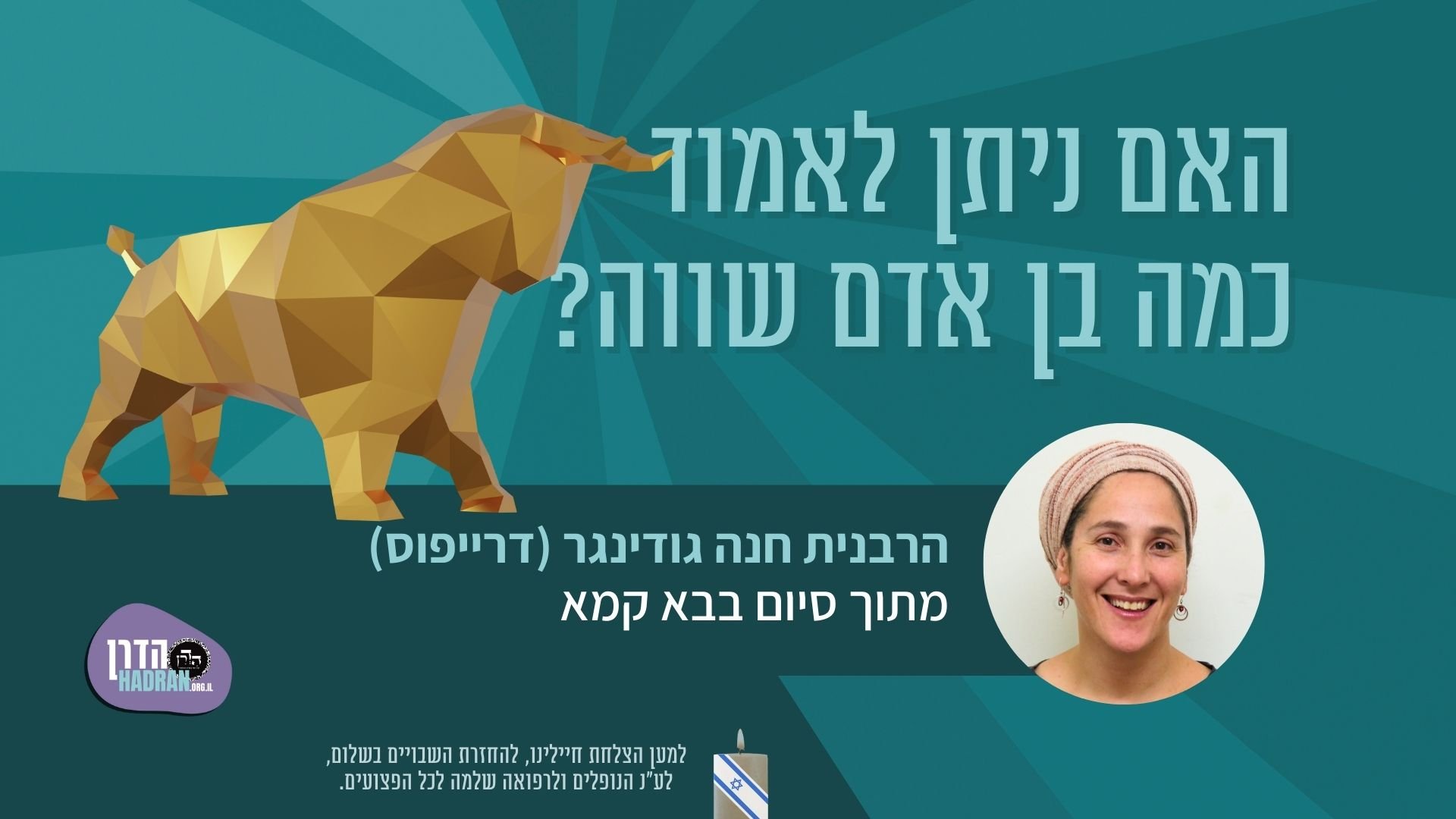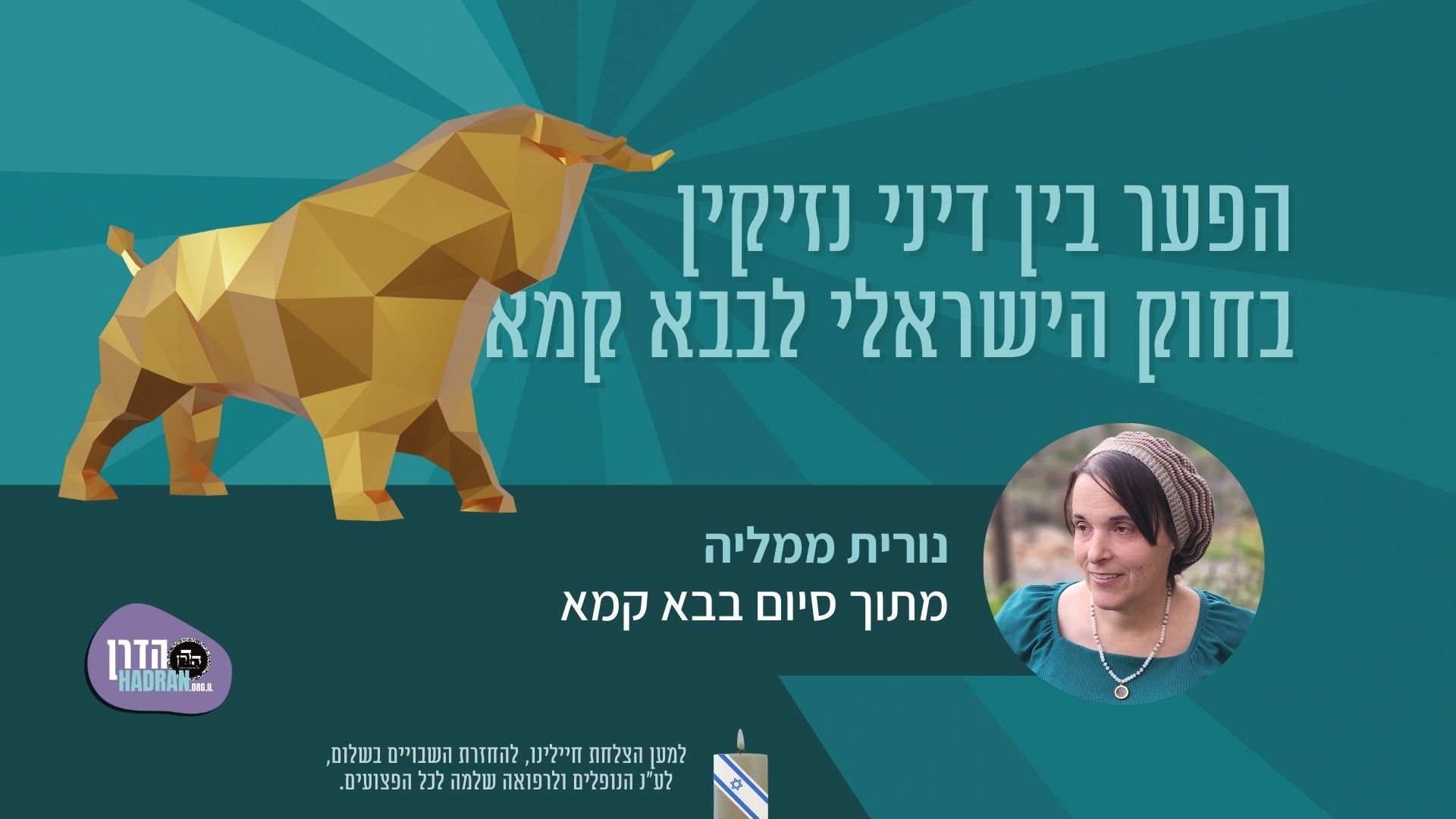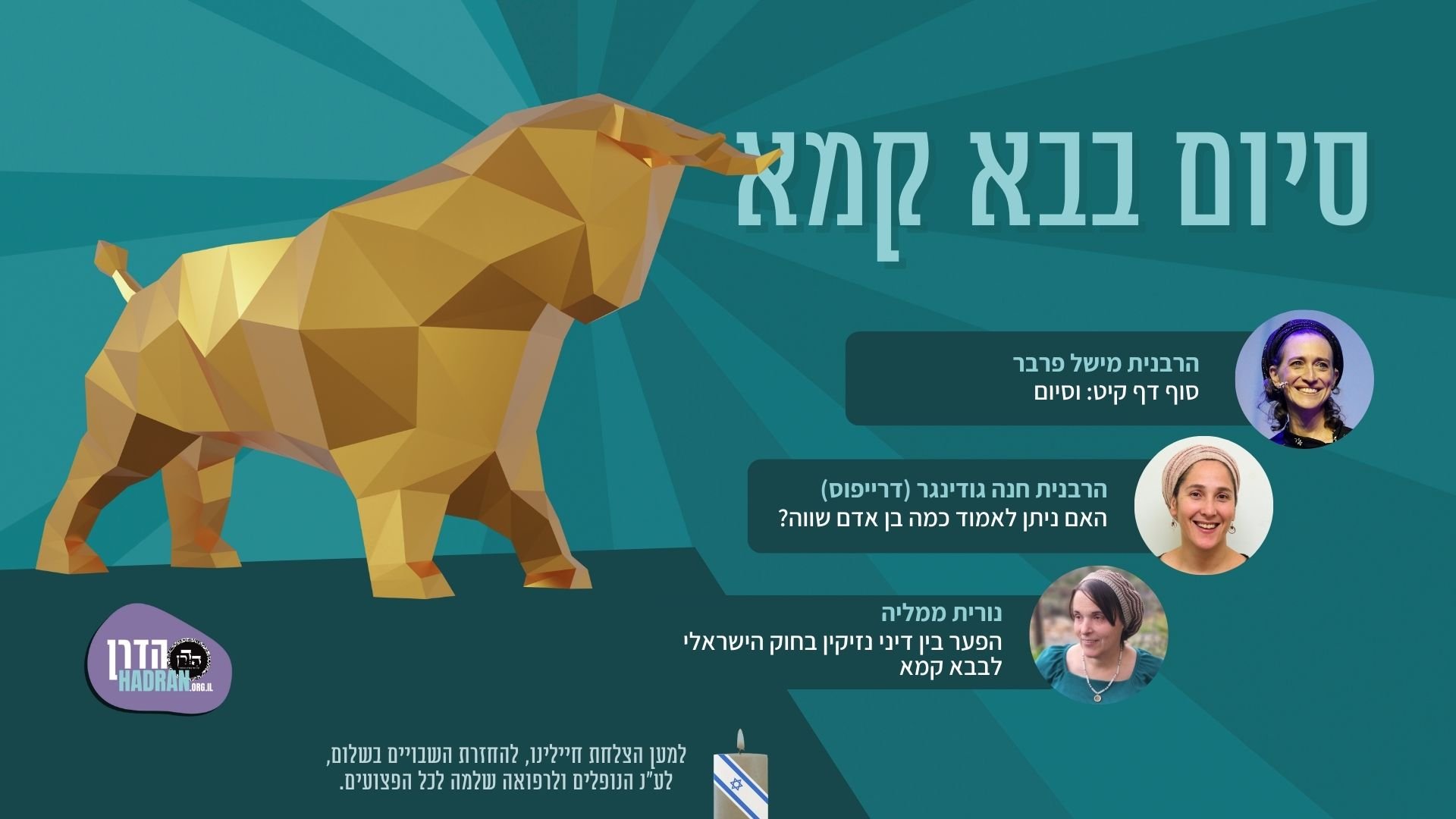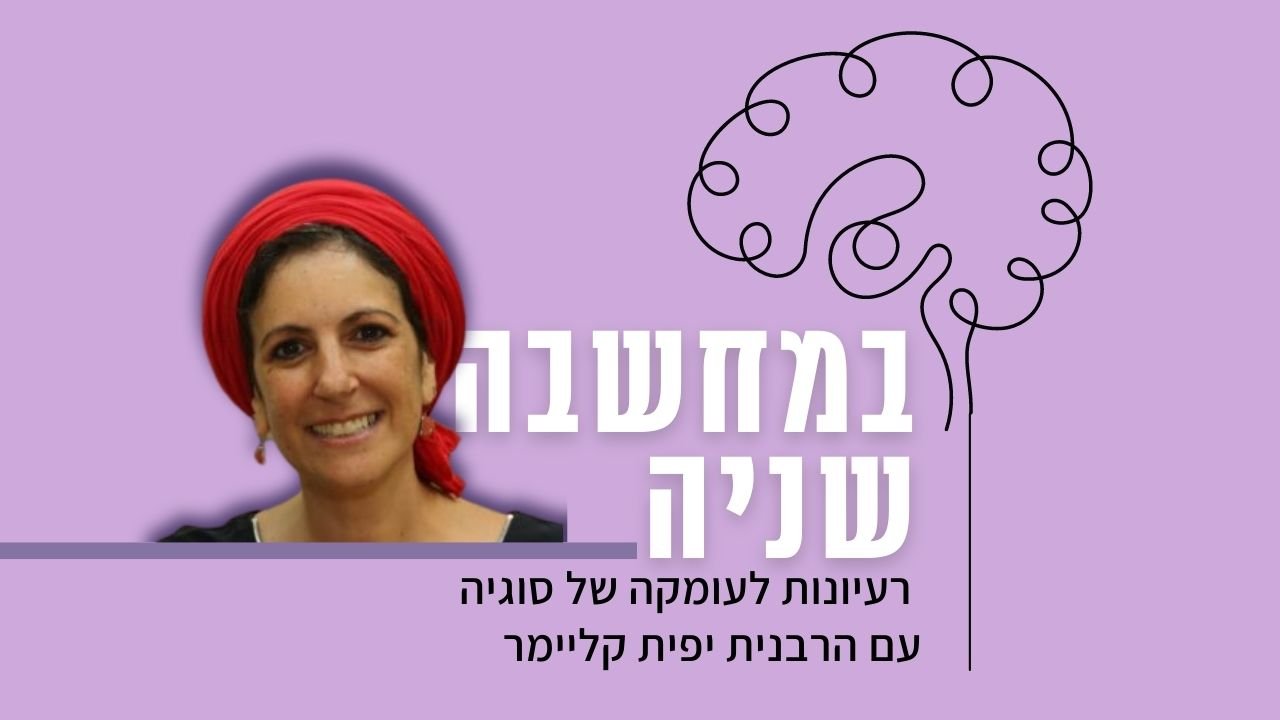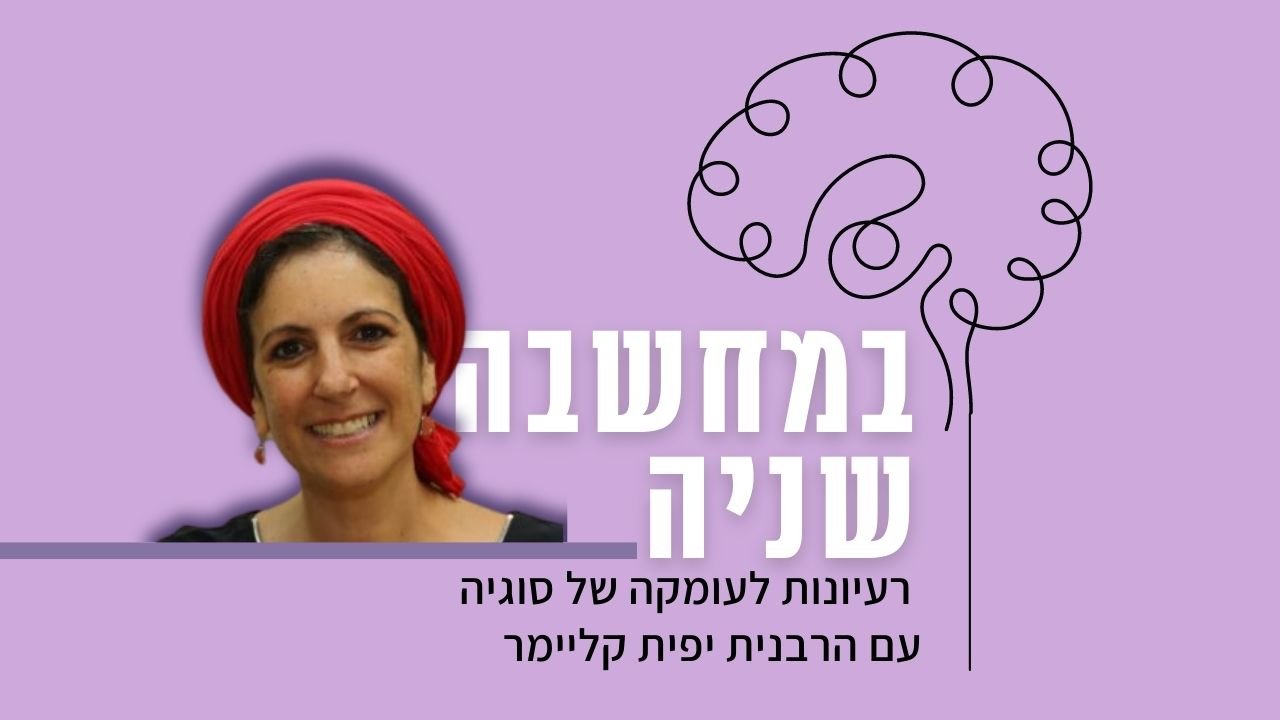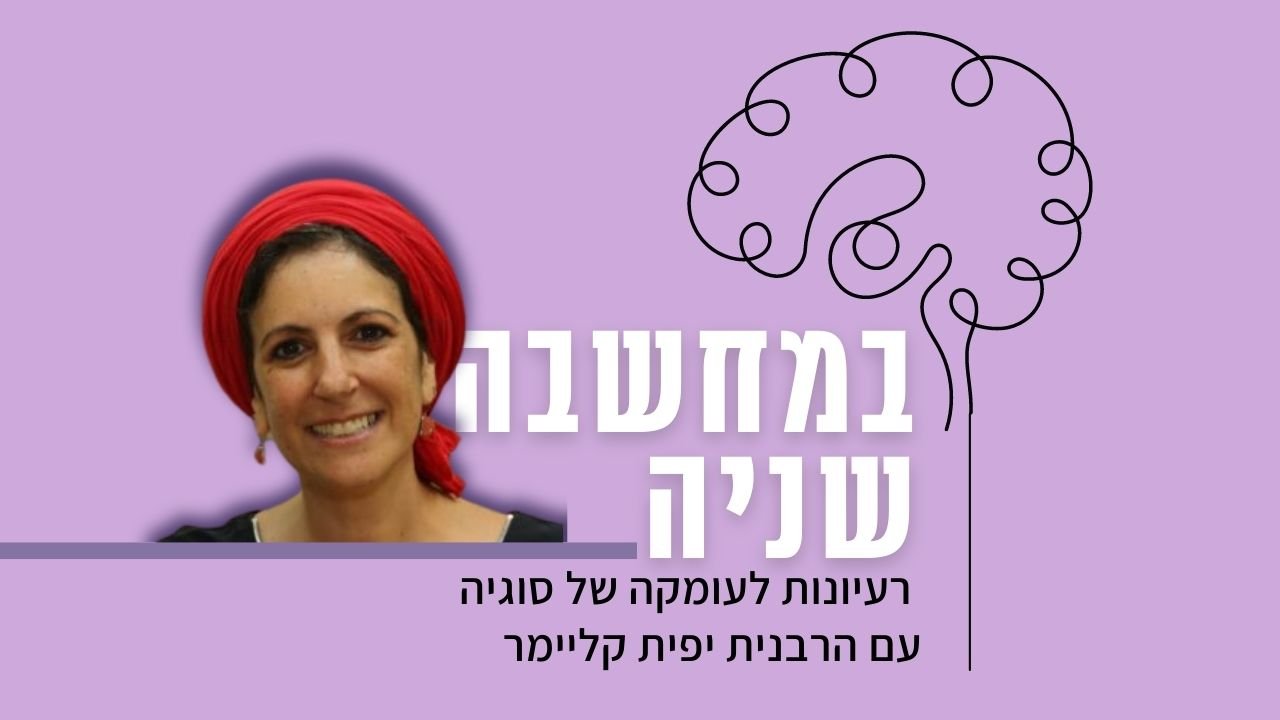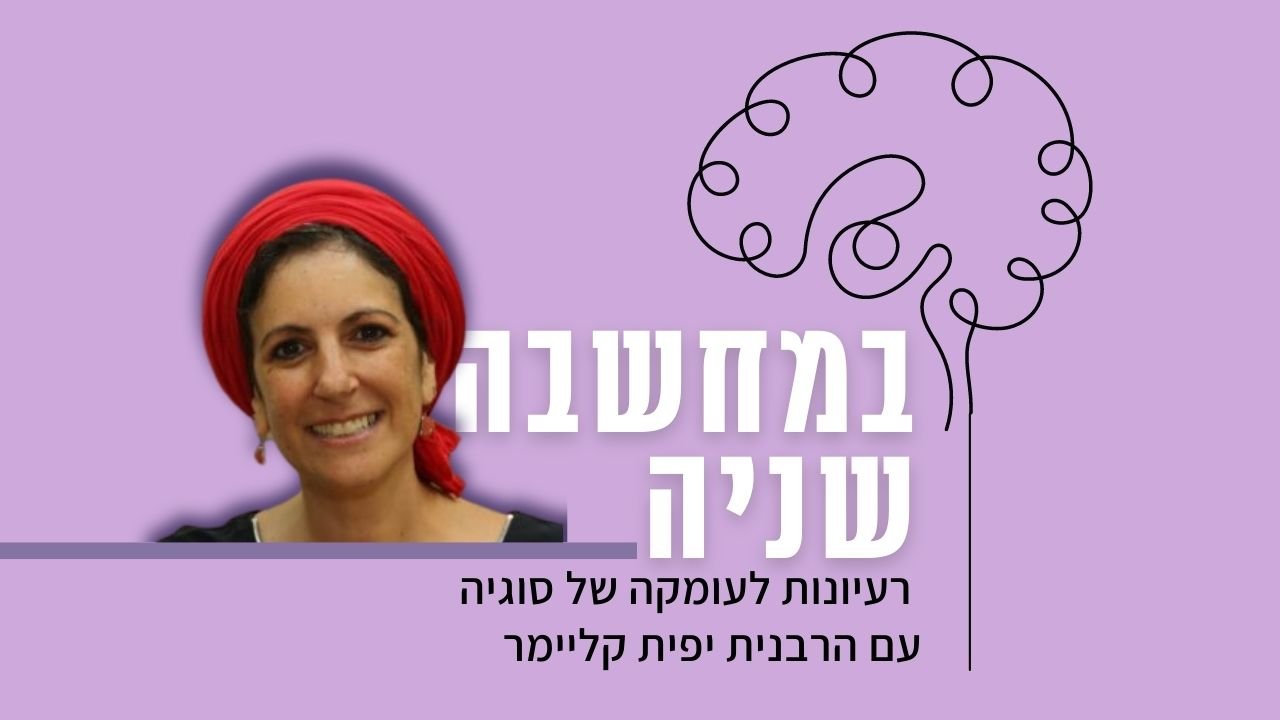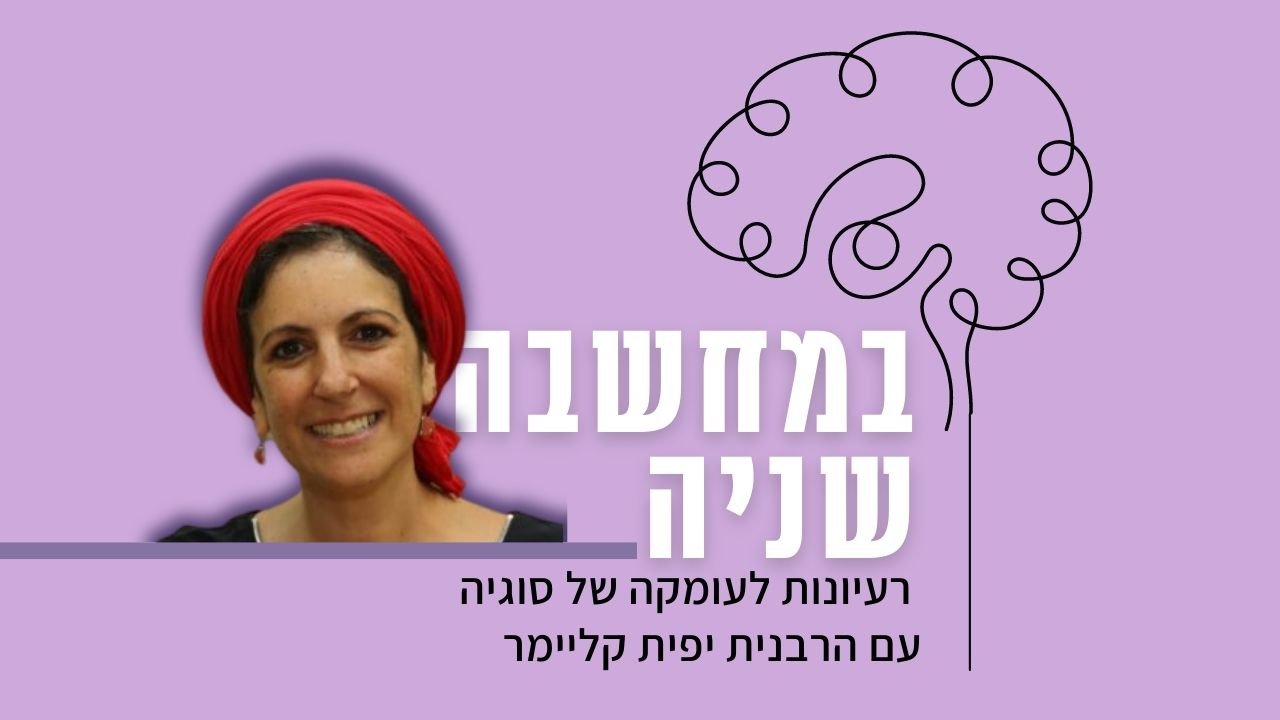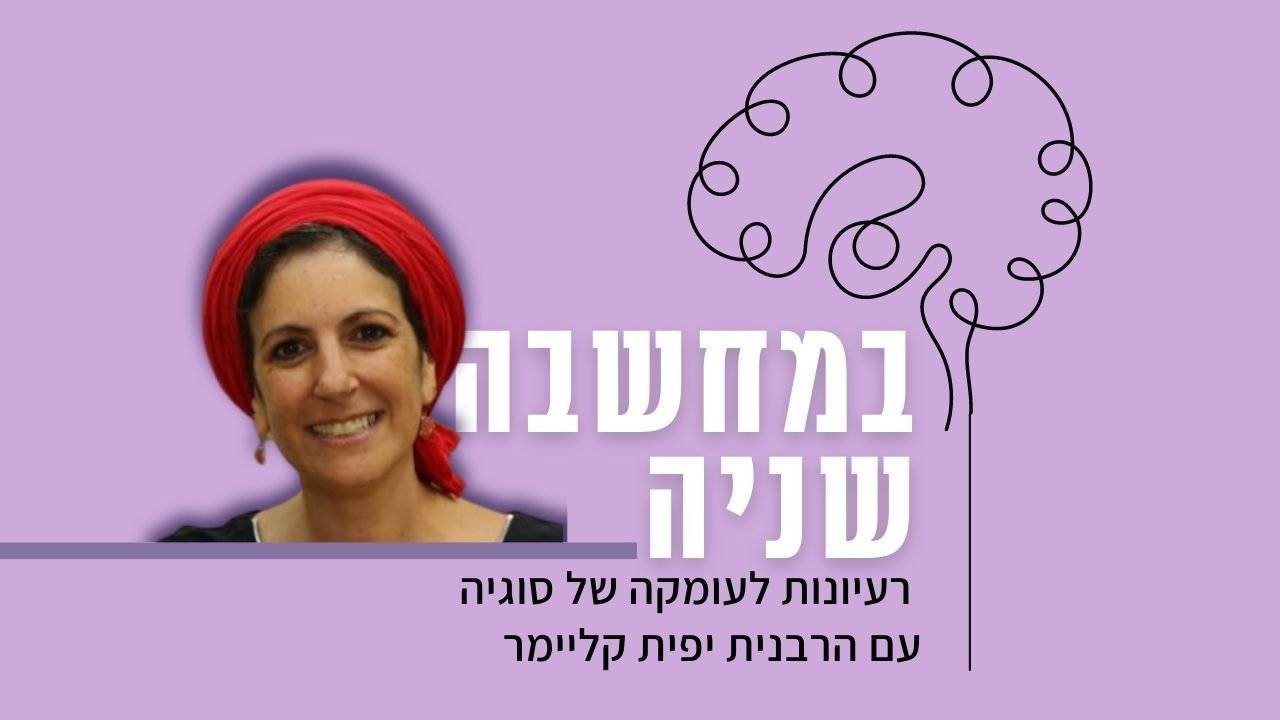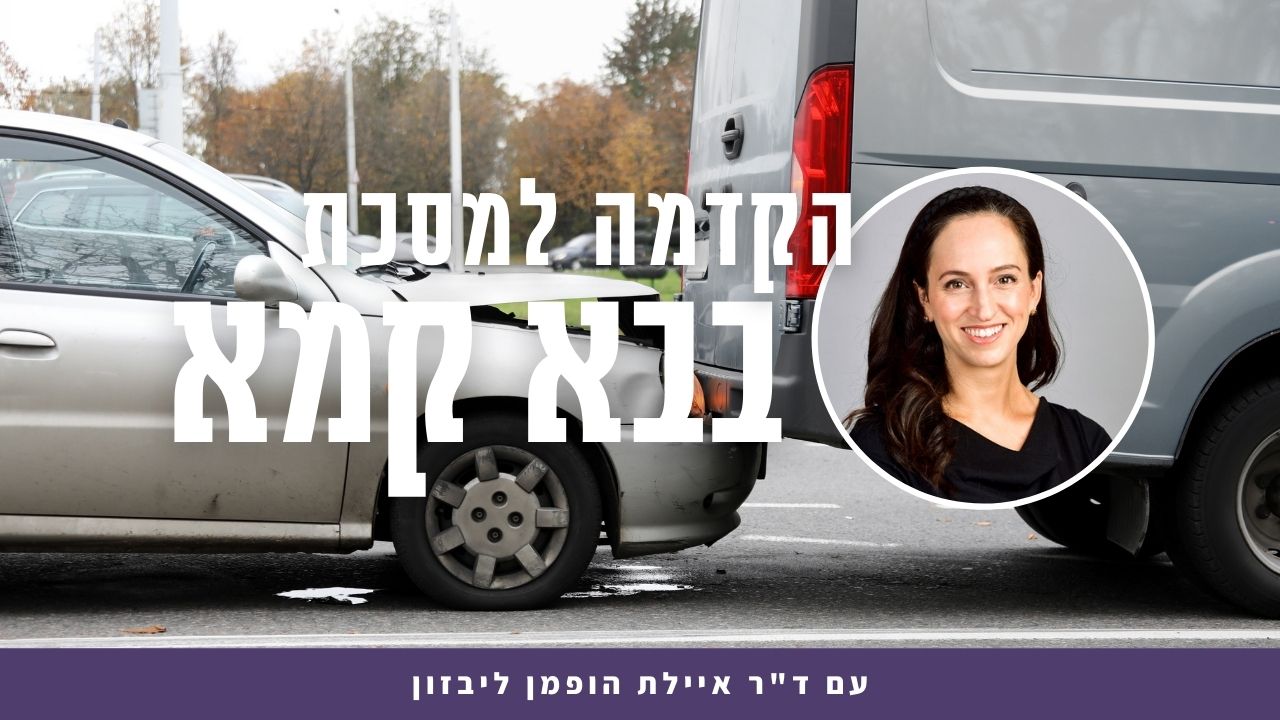בבא קמא קטו
לָא צָרִיךְ לְאַהְדּוֹרֵי עֲלֵיהּ כּוּלֵּי הַאי.
one does not need to pursue the matter in all this detail.
וְדִלְמָא אִיצְטְרִיךְ לֵיהּ זוּזֵי, וְזַבֵּין! אָמַר רַב אָשֵׁי: הֲרֵי יָצָא לוֹ שֵׁם גְּנֵיבָה בָּעִיר.
The Gemara questions this ruling: Perhaps he needed money, and he therefore sold the items despite the fact that he does not generally sell his personal belongings. The Gemara answers that Rav Ashi said: A rumor spread in the city that he had been a victim of theft. It is reasonable to assume that he is the rightful owner, as he does not usually sell his belongings and it is common knowledge that he was the victim of theft.
אִיתְּמַר: גָּנַב וּמָכַר, וְאַחַר כָּךְ הוּכַּר הַגַּנָּב – רַב מִשְּׁמֵיהּ דְּרַבִּי חִיָּיא אָמַר: הַדִּין עִם הָרִאשׁוֹן. רַבִּי יוֹחָנָן מִשְּׁמֵיהּ דְּרַבִּי יַנַּאי אָמַר: הַדִּין עִם הַשֵּׁנִי.
§ Having assessed the mishna’s ruling with regard to a case where the thief remained unidentified, the Gemara discusses a case where the thief was found. It was stated: In a case where a thief stole an item and sold it, and later the thief was identified, Rav says in the name of Rabbi Ḥiyya: The homeowner’s claim can be pursued only with the first one, i.e., the thief, but he has no claim against the purchaser. Rabbi Yoḥanan says in the name of Rabbi Yannai: The homeowner’s claim can also be pursued with the second one, i.e., with the purchaser.
אָמַר רַב יוֹסֵף: לָא פְּלִיגִי; כָּאן לִפְנֵי יֵאוּשׁ – הַדִּין עִם הַשֵּׁנִי, כָּאן לְאַחַר יֵאוּשׁ – הַדִּין עִם הָרִאשׁוֹן.
Rav Yosef said: Rav and Rabbi Yoḥanan do not disagree. Here, in the case about which Rabbi Yoḥanan issues his ruling, the item was purchased from the thief before the victim of the theft despaired of recovering the stolen item. Consequently, the claim can be pursued even with the second one, i.e., the purchaser. Conversely, there, in the case about which Rav issues his ruling, the item was purchased after the victim despaired, and therefore the claim can be pursued only with the first one, i.e., the thief.
וְתַרְוַיְיהוּ אִית לְהוּ דְּרַב חִסְדָּא.
Rav Yosef continues: And both Rav and Rabbi Yoḥanan have accepted as halakha the ruling of Rav Ḥisda (111b), that if the owner had not yet despaired of retrieving his item, he can press his claim against either the thief or the purchaser.
אֲמַר לֵיהּ אַבָּיֵי: וְלָא פְּלִיגִי? הָא מַתְּנוֹת כְּהוּנָּה כְּלִפְנֵי יֵאוּשׁ דָּמֵי, וּפְלִיגִי! דִּתְנַן, אָמַר לוֹ: ״מְכוֹר לִי מֵעֶיהָ שֶׁל פָּרָה״, וְהָיוּ בָּהֶן מַתָּנוֹת – נוֹתְנָן לְכֹהֵן, וְאֵינוֹ מְנַכֶּה לוֹ מִן הַדָּמִים. לָקַח הֵימֶנּוּ בְּמִשְׁקָל – נוֹתְנוֹ לְכֹהֵן, וּמְנַכֶּה לוֹ מִן הַדָּמִים.
Abaye said to Rav Yosef: And is it so that Rav and Rabbi Yoḥanan do not disagree? Isn’t a case involving gifts to which members of the priesthood are entitled comparable to a case of a stolen item that was sold before the onset of the owner’s despair, as the priest still hopes to receive the gifts, and yet Rav and Rabbi Yoḥanan disagree with regard to their legal status? This is as we learned in a mishna (Ḥullin 132a): If one said to a butcher: Sell me the innards of a cow, and the gifts of the priesthood were in them, the purchaser must give the gifts to a priest, and he may not deduct the value of the gifts from the money he agreed to pay the butcher. By contrast, if he purchased the innards from the butcher by weight, he must give the gifts to a priest and he may deduct the value of the gifts from the money he agreed to pay the butcher.
וְאָמַר רַב: לֹא שָׁנוּ אֶלָּא שֶׁשָּׁקַל לְעַצְמוֹ, אֲבָל שָׁקַל לוֹ הַטַּבָּח – הַדִּין עִם הַטַּבָּח.
And Rav says: They taught this halakha only where the purchaser weighed the innards for himself, but if the butcher weighed the innards for him, the priest’s claim may be pursued only with the butcher. The butcher is comparable to a thief when he sells the gifts of the priesthood to a non-priest, and Rav holds that the priest can press his claim only against the butcher. Similarly, in the case of the mishna he would hold that the owner can press his claim only against the thief and not against the purchaser.
אֵימָא: אַף דִּין עִם הַטַּבָּח. מַהוּ דְּתֵימָא: אֵין מַתְּנוֹת כְּהוּנָּה נִגְזָלוֹת, קָא מַשְׁמַע לַן.
The Gemara refutes Abaye’s objection: Say that Rav meant that the priest can even pursue his claim with the butcher, although he is certainly able to claim the gifts from the purchaser. And Rav had to teach this lest you say that gifts of the priesthood are not considered to have been stolen even if the butcher sells them, because wherever they are they remain the legal property of the priests. Rav therefore teaches us that they are considered to have been stolen in this case, and therefore the priest can press his claim against the butcher.
וּלְאַבָּיֵי דְּאָמַר פְּלִיגִי, בְּמַאי פְּלִיגִי? בִּדְרַב חִסְדָּא.
The Gemara asks: And according to Abaye, who said that Rav and Rabbi Yoḥanan disagree, with regard to what do they disagree? The Gemara answers: They disagree with regard to the ruling of Rav Ḥisda. Rav disagrees with Rav Ḥisda and rules that one is entitled to collect only from the thief, while Rabbi Yoḥanan accepts the ruling of Rav Ḥisda and allows one to collect from either the thief or the purchaser.
רַב זְבִיד אָמַר: כְּגוֹן שֶׁנִּתְיָיאֲשׁוּ הַבְּעָלִים בְּיַד לוֹקֵחַ, וְלֹא נִתְיָיאֲשׁוּ בְּיַד גַּנָּב.
The Gemara presents another explanation of the dispute between Rav and Rabbi Yoḥanan: Rav Zevid said that both agree that if the owner has not yet despaired of retrieving his item, he can press his claim against either party. They disagree in a case where the owners despaired of retrieving it only after the item was already in the possession of the purchaser, but they did not yet despair when it was in the possession of the thief.
וּבְהָא פְּלִיגִי – מָר סָבַר: יֵאוּשׁ וְאַחַר כָּךְ שִׁינּוּי רְשׁוּת – קָנֵי, שִׁינּוּי רְשׁוּת וְאַחַר כָּךְ יֵאוּשׁ – לָא קָנֵי; וּמָר סָבַר: לָא שְׁנָא.
And it is with regard to this that they disagree: One Sage, Rabbi Yoḥanan, holds that if there is despair on the part of the owner and afterward there is a change in possession of a stolen item, e.g., it leaves the possession of the thief and enters the possession of a purchaser, the purchaser acquires the item. By contrast, if there is first a change in possession of a stolen item and afterward there is despair on the part of the owner, then the purchaser does not acquire the item. Since in this case the owner did not despair until after the change of possession from the thief to the purchaser, the purchaser did not legally acquire the item, and the owner can press his claim against him. And one Sage, Rav, holds that there is no difference whether the despair or change of possession came first. As long as the owner has despaired of recovering his item, it becomes the property of the purchaser, and the owner cannot demand that he return it.
רַב פָּפָּא אָמַר: בִּגְלִימָא – דְּכוּלֵּי עָלְמָא לָא פְּלִיגִי דְּהָדַר לְמָרֵיהּ, וְהָכָא בְּעָשׂוּ בּוֹ תַּקָּנַת הַשּׁוּק קָמִיפַּלְגִי –
The Gemara presents a third explanation of the dispute: Rav Pappa said that with regard to a stolen cloak itself, everyone agrees that it must be returned by the purchaser to its owner. But here, it is with regard to whether the Sages implemented the provision ensuring the integrity of the marketplace in this case that Rav and Rabbi Yoḥanan disagree.
רַב מִשְּׁמֵיהּ דְּרַבִּי חִיָּיא אָמַר הַדִּין עִם הָרִאשׁוֹן – דִּינָא דְּלוֹקֵחַ דְּלִישְׁקוֹל זוּזֵי מִגַּנָּב, וְלֹא עָשׂוּ בּוֹ תַּקָּנַת הַשּׁוּק. וְרַבִּי יוֹחָנָן מִשּׁוּם דְּרַבִּי יַנַּאי אָמַר הַדִּין עִם הַשֵּׁנִי – דִּינָא דְּלוֹקֵחַ דְּלִישְׁקוֹל מִבַּעַל הַבַּיִת, וְעָשׂוּ בּוֹ תַּקָּנַת הַשּׁוּק.
Rav says in the name of Rabbi Ḥiyya that the claim can be pursued only with the first one, i.e., the thief, meaning that the law with regard to the purchaser is that, after returning the item to its owner, he can collect money only from the thief, and the Sages did not implement the provision ensuring the integrity of the marketplace in this case. And Rabbi Yoḥanan says in the name of Rabbi Yannai that the claim of the purchaser can be pursued with the second one, meaning that the law with regard to the purchaser is that he can also collect the money from the owner when he returns the item to him, and the Sages did implement the provision ensuring the integrity of the marketplace in this case.
וְסָבַר רַב לֹא עָשׂוּ בּוֹ תַּקָּנַת הַשּׁוּק? וְהָא רַב הוּנָא תַּלְמִידֵיהּ דְּרַב הֲוָה, וְחָנָן בִּישָׁא גְּנַב גְּלִימָא וְזַבְּנַהּ. אֲתָא לְקַמֵּיהּ דְּרַב הוּנָא, אֲמַר לֵיהּ לְהָהוּא גַּבְרָא: זִיל שְׁרִי עֲבִיטָךְ!
The Gemara questions this answer: And did Rav hold that the Sages did not implement the provision ensuring the integrity of the marketplace in this case? But wasn’t Rav Huna a student of Rav, and yet when a certain thief known as Ḥanan the Wicked stole a cloak and then sold it, and the case came before Rav Huna, he said to that man from whom the cloak was stolen: Go redeem your pledge from the purchaser, i.e., reimburse the purchaser for the garment that he returned to you. Evidently, Rav’s own student held that the Sages did allow a purchaser to claim reimbursement from the owner.
שָׁאנֵי חָנָן בִּישָׁא, כֵּיוָן דְּלֵיכָּא לְאִישְׁתַּלּוֹמֵי מִינֵּיהּ – כְּלֹא הוּכַּר דָּמֵי.
The Gemara answers that Ḥanan the Wicked is different. Since he has no money, there is no way for the purchaser to collect payment from him, and the case is therefore comparable to a case where the thief was not identified, with regard to which case the Sages implemented the provision ensuring the integrity of the marketplace.
אָמַר רָבָא: אִם גַּנָּב מְפוּרְסָם הוּא, לֹא עָשׂוּ בּוֹ תַּקָּנַת הַשּׁוּק. וְהָא חָנָן בִּישָׁא, דִּמְפוּרְסָם הֲוָה, וְעָשׂוּ בּוֹ תַּקָּנַת הַשּׁוּק! נְהִי דִּמְפוּרְסַם לְבִישׁוּתָא, לִגְנִיבוּתָא לָא מְפוּרְסַם.
Rava says: If he is a well-known thief, the Sages did not implement the provision ensuring the integrity of the marketplace in this case. The purchaser should have been aware that the item may be stolen and should not have purchased it. The Gemara asks: But wasn’t Ḥanan the Wicked well known, and yet, according to Rav Huna, the Sages implemented the provision ensuring the integrity of the marketplace in this case? The Gemara answers: Although he was well known for villainy, he was not well known for theft.
אִיתְּמַר: גָּנַב וּפָרַע בְּחוֹבוֹ, גָּנַב וּפָרַע בְּהֶיקֵּיפוֹ – לֹא עָשׂוּ בּוֹ תַּקָּנַת הַשּׁוּק, דְּאָמְרִי: לָא אַדַּעְתָּא דְּהָנְהוּ יְהַבְתְּ לֵיהּ מִידֵּי.
§ The Gemara continues to examine the provision ensuring the integrity of the marketplace. It was stated: With regard to one who stole and repaid his debt with the stolen item, or one who stole and repaid his debt from credit that was extended to him with the stolen item, the Sages did not implement the provision ensuring the integrity of the marketplace in this case, as they say to the creditor: It was not with the expectation of receiving these stolen items that you gave the debtor anything.
מַשְׁכַּנְתָּא; שָׁוֵי מָאתַן בִּמְאָה – עָשׂוּ בּוֹ תַּקָּנַת הַשּׁוּק. שָׁוֶה בְּשָׁוֶה – אַמֵּימָר אָמַר: לֹא עָשׂוּ בּוֹ תַּקָּנַת הַשּׁוּק, מָר זוּטְרָא אָמַר: עָשׂוּ בּוֹ תַּקָּנַת הַשּׁוּק.
With regard to the integrity of the marketplace, it was also stated that if a thief provided a stolen item worth two hundred dinars as collateral for a loan of one hundred dinars, the Sages implemented the provision ensuring the integrity of the marketplace in this case. Consequently, the creditor is entitled to reimbursement from the owner for returning the collateral. If the collateral and the loan were of equal value, Ameimar said: The Sages did not implement the provision ensuring the integrity of the marketplace in this case, while Mar Zutra said: The Sages did implement the provision ensuring the integrity of the marketplace in this case.
וְהִלְכְתָא: עָשׂוּ בּוֹ תַּקָּנַת הַשּׁוּק.
The Gemara comments: And the halakha is in accordance with the opinion of Mar Zutra that the Sages did implement the provision ensuring the integrity of the marketplace in this case.
זְבִינָא; שָׁוֶה בְּשָׁוֶה – עָשׂוּ בּוֹ תַּקָּנַת הַשּׁוּק. שָׁוֵי מְאָה בְּמָאתַן – רַב שֵׁשֶׁת אָמַר: לֹא עָשׂוּ בּוֹ תַּקָּנַת הַשּׁוּק, רָבָא אָמַר: עָשׂוּ בּוֹ תַּקָּנַת הַשּׁוּק.
The Gemara examines other applications of this provision: In a sale, if the stolen item was purchased for an amount equal to its actual market value, the Sages implemented the provision ensuring the integrity of the marketplace in this case. If a stolen item worth one hundred dinars was purchased at the price of two hundred dinars, Rav Sheshet says: The Sages did not implement the provision ensuring the integrity of the marketplace in this case, while Rava says: The Sages did implement the provision ensuring the integrity of the marketplace in this case.
וְהִלְכְתָא: בְּכוּלְּהוּ עָשׂוּ בּוֹ תַּקָּנַת הַשּׁוּק, לְבַר מִגָּנַב וּפָרַע בְּחוֹבוֹ, גָּנַב וּפָרַע בְּהֶיקֵּיפוֹ.
The Gemara states: And the halakha is that in all these cases the Sages implemented the provision ensuring the integrity of the marketplace, except with regard to one who stole and repaid his debt with the stolen item and one who stole and repaid his debt from credit that was extended to him with the stolen item.
אֲבִימִי בַּר נָאזִי חֲמוּהּ דְּרָבִינָא הֲוָה מַסֵּיק בְּהָהוּא גַּבְרָא אַרְבְּעָה זוּזֵי. גְּנַב גְּלִימָא אֵתְיַאּ נִיהֲלֵיהּ, אוֹזְפֵיהּ אַרְבְּעָה זוּזֵי אַחֲרִינֵי. לְסוֹף הוּכַּר הַגַּנָּב. אֲתָא לְקַמֵּיהּ דְּרָבִינָא,
The Gemara recounts a related incident: Avimi bar Nazi, the father-in-law of Ravina, was owed four dinars by a certain man, who then stole a cloak and brought it to Avimi as repayment for the loan. Avimi then lent him four additional dinars. In the end, the thief was identified as the debtor, and the case came before Ravina to determine whether or not the owner would have to pay Avimi for returning the cloak.
אֲמַר: קַמָּאֵי – גָּנַב וּפָרַע בְּחוֹבוֹ, וְלָא בָּעֵי לְמִיתַּב לֵיהּ וְלָא מִידֵּי; הָנָךְ אַרְבְּעָה זוּזֵי אַחֲרִינֵי – שְׁקוֹל זוּזָךְ, וְ[אַ]הְדַּר גְּלִימֵי[הּ].
Ravina said to Avimi: With regard to the first four dinars that were lent, the thief is viewed as one who stole and repaid his debt, and the owner is not required to give anything in exchange for the garment’s return as the Sages’ ordinance ensuring the integrity of the marketplace does not apply in such a case. With regard to those four additional dinars, take your money from the owner of the cloak and return the cloak to him. Since Avimi lent the second set of dinars only because he had received the cloak, Ravina ruled that the Sages’ ordinance applied to him.
מַתְקֵיף לַהּ רַב כֹּהֵן: וְדִלְמָא גְּלִימָא – בְּהָנֵי זוּזֵי קַמָּאֵי יַהֲבַהּ נִיהֲלֵיהּ, ״גָּנַב וּפָרַע בְּחוֹבוֹ, גָּנַב וּפָרַע בְּהֶיקֵּיפוֹ״; וְאַרְבְּעָה זוּזֵי בָּתְרָאֵי – הֵימוֹנֵי הֵימְנֵיהּ, כִּי הֵיכִי דְּהֵימְנֵיהּ מֵעִיקָּרָא! אִיגַּלְגַּל מִילְּתָא, מְטָא לְקַמֵּיהּ דְּרַבִּי אֲבָהוּ, אָמַר: הִלְכְתָא כְּרַב כֹּהֵן.
Rav Kohen objects to this: But perhaps the cloak was given to Avimi only in payment for these first four dinars, and it was a case of a thief who stole and repaid his debt or who stole and repaid his debt from credit that was extended to him with the stolen item. And the latter four dinars were loaned because Avimi trusted the debtor, just as he trusted him initially, when he lent the first four dinars. The cloak was not collateral for the second loan, and therefore the Sages’ ordinance should not apply. The matter circulated until it came before Rabbi Abbahu, who said: The halakha is in accordance with the opinion of Rav Kohen.
נַרְשָׁאָה גְּנַב סִפְרָא, זַבְּנֵיהּ לְפַפּוּנָאָה בִּתְמָנַן זוּזֵי. אֲזַל פַּפּוּנָאָה, זַבְּנֵיהּ לְבַר מָחוֹזָאָה בִּמְאָה וְעֶשְׂרִין זוּזֵי. לְסוֹף הוּכַּר הַגַּנָּב. אָמַר אַבָּיֵי: לֵיזִיל מָרֵי דְסִפְרָא וְיָהֵב לֵיהּ לְבַר מָחוֹזָא תְּמָנַן זוּזֵי וְשָׁקֵיל סִפְרֵיהּ, וְאָזֵיל בַּר מָחוֹזָאָה וְשָׁקֵיל אַרְבְּעִין מִפַּפּוּנָאָה.
The Gemara recounts another incident: A resident of Naresh stole a scroll and sold it to a resident of Pappunya for eighty dinars. The resident of Pappunya then went and sold it to a resident of Meḥoza for one hundred and twenty dinars. In the end, the thief was identified and Abaye said: The original owner of the scroll should go and give the resident of Meḥoza eighty dinars and take his scroll in return. And afterward, the resident of Meḥoza should go and take the remaining forty dinars from the resident of Pappunya.
מַתְקֵיף לַהּ רָבָא: הַשְׁתָּא לוֹקֵחַ מִגַּנָּב – עָשׂוּ בּוֹ תַּקָּנַת הַשּׁוּק, לוֹקֵחַ מִלּוֹקֵחַ מִיבַּעְיָא?
Rava objects to this: Now that it has been established that with regard to one who purchases from a thief, the Sages implemented the provision ensuring the integrity of the marketplace in this case despite the fact that he dealt with the thief directly, is it necessary to teach that the same would apply to one who purchased a stolen item from a purchaser? Accordingly, the final purchaser is entitled to receive from the original owner the full amount that he paid for the item.
אֶלָּא אָמַר רָבָא: לֵיזִיל מָרֵיהּ דְּסִפְרָא וְיָהֵיב לֵיהּ לְבַר מָחוֹזָאָה מְאָה וְעֶשְׂרִין זוּזֵי וְשָׁקֵיל סִפְרֵיהּ, וְלֵיזִיל מָרֵי[הּ] דְסִפְרָא וְלִישְׁקוֹל אַרְבְּעִין מִפַּפּוּנָאָה, וּתְמָנַן מִנַּרְשָׁאָה.
Rather, Rava said that the original owner of the scroll should go and give the resident of Meḥoza one hundred and twenty dinars and take his scroll in return. And afterward the original owner of the scroll should go and collect forty dinars from the resident of Pappunya and eighty dinars from the resident of Naresh, as each profited from the sale in these amounts, respectively.
מַתְנִי׳ זֶה בָּא בְּחָבִיתוֹ שֶׁל יַיִן וְזֶה בָּא בְּכַדּוֹ שֶׁל דְּבַשׁ, נִסְדְּקָה חָבִית שֶׁל דְּבַשׁ, וְשָׁפַךְ זֶה אֶת יֵינוֹ וְהִצִּיל אֶת הַדְּבַשׁ לְתוֹכוֹ –
MISHNA: In a situation where this individual came with his barrel of wine, and that individual came with his jug of honey, if the barrel of honey cracked and this first individual poured out his wine and salvaged the other’s honey, which is worth more than the wine, by collecting it into his wine barrel,
אֵין לוֹ אֶלָּא שְׂכָרוֹ. וְאִם אָמַר: ״אַצִּיל אֶת שֶׁלְּךָ, וְאַתָּה נוֹתֵן לִי דְּמֵי שֶׁלִּי״ – חַיָּיב לִיתֵּן לוֹ.
the owner of the wine has the right to collect only his wage, i.e., compensation for the effort he put into salvaging the honey. He is not, however, entitled to compensation for the wine itself. But if the owner of the wine said: I will salvage your honey and you will pay me the value of my wine, the owner of the honey is obligated to pay him compensation for the wine.
שָׁטַף נַחַל חֲמוֹרוֹ וַחֲמוֹר חֲבֵירוֹ, שֶׁלּוֹ יָפֶה מָנֶה וְשֶׁל חֲבֵירוֹ מָאתַיִם, וְהִנִּיחַ זֶה אֶת שֶׁלּוֹ וְהִצִּיל אֶת שֶׁל חֲבֵירוֹ – אֵין לוֹ אֶלָּא שְׂכָרוֹ. וְאִם אָמַר לוֹ: ״אֲנִי אַצִּיל אֶת שֶׁלְּךָ, וְאַתָּה נוֹתֵן לִי אֶת שֶׁלִּי״ – חַיָּיב לִיתֵּן לוֹ.
Similarly, if a river washed away his donkey and the donkey of another, and his donkey was worth one hundred dinars and the donkey of the other was worth two hundred, and the individual with the less valuable donkey abandoned his donkey and instead salvaged the donkey of the other, he has the right to collect only his wage, i.e., compensation for the effort he put into salvaging his fellow’s donkey. But if he said to the owner of the more valuable donkey: I will salvage your donkey and you will pay me the monetary value of mine in exchange, the owner of the more valuable donkey is obligated to pay the rescuer compensation for his donkey.
גְּמָ׳ וְאַמַּאי? לֵימָא לֵיהּ: מֵהֶפְקֵירָא קָא זָכֵינָא! מִי לָא תַּנְיָא: הֲרֵי שֶׁהָיָה טָעוּן כַּדֵּי יַיִן וְכַדֵּי שֶׁמֶן, וְרָאָה שֶׁהֵן מִשְׁתַּבְּרוֹת, לֹא יֹאמַר: ״הֲרֵי זֶה תְּרוּמָה וּמַעֲשֵׂר עַל פֵּירוֹת שֶׁיֵּשׁ לִי בְּתוֹךְ בֵּיתִי״, וְאִם אָמַר – לֹא אָמַר כְּלוּם?
GEMARA: And why does one who pours out wine have the right to collect only this wage? Let him say to the owner of the honey: I have acquired your honey from ownerless property. Isn’t it taught in a baraita: One who was laden with jugs of wine and jugs of oil and saw that they were breaking and their contents were leaking out should not say: This is hereby separated as teruma and tithe for the produce that I have in my house. And even if he said this, it is as though he did not say anything. The fact that one cannot separate produce that is about to be lost as teruma or tithe indicates that such property is considered ownerless.
כִּדְאָמַר רַבִּי יִרְמְיָה: כְּשֶׁעֵקֶל בֵּית הַבַּד כָּרוּךְ עָלֶיהָ; הָכִי נָמֵי, כְּשֶׁעֵקֶל בֵּית הַבַּד כָּרוּךְ עָלֶיהָ.
The Gemara answers that it is as Rabbi Yirmeya says in a different context, that the ruling discussed there is referring to a case where the basket of the olive press was wrapped around it so that the barrel would not break completely, and some of the contents would remain inside. So too, here, the mishna issued its ruling only when the basket of the olive press was wrapped around the honey barrel so that it would not break completely, and the contents are therefore not rendered ownerless.
וְאִם אָמַר – לֹא אָמַר כְּלוּם? וְהָתַנְיָא: מִי שֶׁבָּא בַּדֶּרֶךְ וּמָעוֹת בְּיָדוֹ וְאַנָּס כְּנֶגְדּוֹ, לֹא יֹאמַר: ״הֲרֵי פֵּירוֹת שֶׁיֵּשׁ לִי בְּתוֹךְ בֵּיתִי מְחוּלָּלִים עַל מָעוֹת הַלָּלוּ״, וְאִם אָמַר – דְּבָרָיו קַיָּימִין!
The Gemara challenges the baraita that stated: And even if he said that the wine or oil is separated as teruma or tithe, it is as though he did not say anything. But isn’t it taught in a different baraita: If one was traveling on the road and had money in his possession, and he saw a ruffian moving toward him, he should not say: The second-tithe produce that I have in my house is hereby desacralized onto these coins, i.e., the sanctity of the produce is hereby transferred to the coins. But if he said so, his statement stands, and the produce is desacralized while the coins attain the sanctity of the second tithe.
הָכָא בְּמַאי עָסְקִינַן – בְּשֶׁיָּכוֹל לְהַצִּיל. אִי בְּשֶׁיָּכוֹל לְהַצִּיל, לְכַתְּחִלָּה אַמַּאי לֹא יֹאמַר? בְּשֶׁיָּכוֹל לְהַצִּיל עַל יְדֵי הַדְּחָק.
The Gemara answers: Here we are dealing with a case where he is capable of saving his money from the ruffian and that is why he may transfer the sanctity of the second tithe to the coins. The Gemara asks: If it is a case where he is capable of saving the money, why should he not say that the produce should be desacralized ab initio? The Gemara answers: It is a case where he is capable of saving the money only with difficulty. Consequently, he should not transfer the sanctity of the second tithe to the coins, as it may be lost; but if he does so, the transfer takes effect, as it is not certain that the money will be lost.
וְכֹל הֵיכָא דְּאִיכָּא הֶפְסֵידָא, לְכַתְּחִלָּה לֹא יֹאמַר? וְהָתַנְיָא: הֲרֵי שֶׁהָיוּ לוֹ עֶשֶׂר חָבִיּוֹת שֶׁל טֶבֶל טָמֵא, וְרָאָה אַחַת מֵהֶן שֶׁנִּשְׁבְּרָה אוֹ שֶׁנִּתְגַּלְּתָה, אוֹמֵר: ״הֲרֵי הִיא תְּרוּמַת מַעֲשֵׂר עַל תֵּשַׁע חַבְרוֹתֶיהָ״. וּבְשֶׁמֶן לֹא יַעֲשֶׂה כֵּן, מִפְּנֵי הֶפְסֵד כֹּהֵן!
The Gemara asks: And is it so that wherever there is a potential loss one should not say that the sanctity is transferred to the money ab initio? But isn’t it taught otherwise in the following baraita: If one had ten barrels of ritually impure, untithed wine, i.e., first-tithe wine from which the teruma of the tithe had not yet been separated, and he saw that one of them had broken and that its contents were leaking out, or that it had been exposed and is forbidden for consumption, he may say: This barrel is hereby separated as the teruma of the tithe for the other nine barrels. But with regard to oil, he should not do so due to the priest’s loss.
אָמַר רַבִּי יִרְמְיָה: כְּשֶׁעֵקֶל בֵּית הַבַּד כָּרוּךְ עָלֶיהָ. בִּשְׁלָמָא שֶׁנִּשְׁבְּרָה – חַזְיָא, אֶלָּא נִתְגַּלְּתָה – לְמַאי חַזְיָא?
The Gemara answers that Rabbi Yirmeya said: The baraita issued its ruling only when the basket of the olive press was wrapped around the barrel so that some of its contents would remain inside. The Gemara asks: Granted, this rationale applies to a barrel that was broken, as the remaining contents are still fit for use, but with regard to a barrel that was exposed, for what use is it fit?
וְכִי תֵּימָא חַזְיָא לְזִילּוּף, וְהָתַנְיָא: מַיִם שֶׁנִּתְגַּלּוּ – הֲרֵי זֶה לֹא יִשְׁפְּכֵם בִּרְשׁוּת הָרַבִּים; וְלֹא יְגַבֵּל בָּהֶן אֶת הַטִּיט; וְלֹא יְרַבֵּץ בָּהֶן אֶת הַבַּיִת; וְלֹא יַשְׁקֶה מֵהֶם אֶת בְּהֶמְתּוֹ, וְלֹא בֶּהֱמַת חֲבֵירוֹ!
And if you would say that the exposed wine is fit for sprinkling, in order to spread its pleasant aroma, isn’t it taught otherwise in the following baraita? With regard to water that was exposed, one may not pour it out in the public domain, nor mix clay with it, nor settle dust with it by sprinkling it in a house, nor give it to his animal to drink, nor give it to the animal of another. This proves that exposed liquids may not be used even for sprinkling.
דְּעַבַּר לָהּ בִּמְסַנֶּנֶת, כְּרַבִּי נְחֶמְיָה – דְּתַנְיָא: מְסַנֶּנֶת, יֵשׁ בָּהּ מִשּׁוּם גִּילּוּי. אָמַר רַבִּי נְחֶמְיָה: אֵימָתַי – בִּזְמַן שֶׁהַתַּחְתּוֹנָה מְגוּלָּה, אֲבָל בִּזְמַן שֶׁהַתַּחְתּוֹנָה מְכוּסָּה – אַף עַל פִּי שֶׁהָעֶלְיוֹנָה מְגוּלָּה, אֵין בָּהּ מִשּׁוּם גִּילּוּי; לְפִי שֶׁאֶרֶס שֶׁל נָחָשׁ דּוֹמֶה לִסְפוֹג, וְצָף וְעוֹמֵד בִּמְקוֹמוֹ.
The Gemara answers: The wine is fit for use because he passed it through a strainer, and it is in accordance with the opinion of Rabbi Neḥemya, as it is taught in a baraita: A vessel covered with a strainer is subject to the halakha of exposure if the vessel is left unsupervised. Rabbi Neḥemya said: When is this so? It is so when the lower vessel, in which the liquid collects after passing through the strainer, is exposed. But when the lower vessel is covered, even if the upper vessel is exposed, it is not subject to the halakha of exposure, because the venom of a snake is like a sponge in that it floats and stays in place.
לָאו אִיתְּמַר עֲלַהּ, אָמַר רַבִּי סִימוֹן אָמַר רַבִּי יְהוֹשֻׁעַ בֶּן לֵוִי: לֹא שָׁנוּ אֶלָּא שֶׁלֹּא טְרָקוֹ, אֲבָל טְרָקוֹ – אָסוּר?
The Gemara questions this explanation: Wasn’t it stated with regard to Rabbi Neḥemya’s ruling that Rabbi Simon says that Rabbi Yehoshua ben Levi says: They taught Rabbi Neḥemya’s ruling only where one did not mix it, but if one mixed the wine, any venom found in it becomes capable of penetrating the strainer? Consequently, the wine remains forbidden even if it is passed through a strainer.
הָתָם נָמֵי, אֶפְשָׁר דְּמַנַּח מִידֵּי אַפּוּמָּא דְחָבִיתָא, (דְּשָׁפֵי) [וְשָׁפֵי] לֵיהּ.
The Gemara answers: There, too, it is possible to prevent the venom from mixing with the wine by placing something upon the mouth of a barrel that will filter it slowly so that the venom will not penetrate the strainer, and the wine may therefore be used.
וְרַבִּי נְחֶמְיָה – (מִטָּמֵא אַטָּמֵא) מִי תָּרְמִינַן?
It has now been established that the baraita, which states that if one’s barrel of untithed, impure wine is breaking, he may separate it as teruma of the tithe for other barrels of untithed, impure wine, may be explained in accordance with the opinion of Rabbi Neḥemya. The Gemara asks: And according to Rabbi Neḥemya, may we separate teruma from impure produce for other impure produce?
וְהָתַנְיָא: תּוֹרְמִין מִן הַטָּמֵא עַל הַטָּמֵא, וּמִן הַטָּהוֹר עַל הַטָּהוֹר, וּמִן הַטָּהוֹר עַל הַטָּמֵא; אֲבָל לֹא מִן הַטָּמֵא עַל הַטָּהוֹר. רַבִּי נְחֶמְיָה אוֹמֵר: אַף מִן הַטָּמֵא עַל הַטָּמֵא לֹא הִתִּירוּ לִתְרוֹם, אֶלָּא בְּשֶׁל דְּמַאי! הָכָא נָמֵי בְּשֶׁל דְּמַאי.
But isn’t it taught in another baraita: One may separate teruma from produce that is impure for other produce that is impure, and from produce that is pure for other produce that is pure, and from produce that is pure for produce that is impure, but not from produce that is impure for produce that is pure. Rabbi Neḥemya says: Even with regard to separating from produce that is impure for produce that is impure, the Sages permitted one to separate teruma in this manner only in the case of doubtfully tithed produce [demai]. Consequently, how can the aforementioned baraita unequivocally permit one to separate impure wine as teruma of the tithe for other impure wine? The Gemara answers: Here too, in the baraita, it is discussing a case of demai.
אָמַר מָר: וּבְשֶׁמֶן לֹא יַעֲשֶׂה כֵּן, מִפְּנֵי הֶפְסֵד כֹּהֵן. מַאי שְׁנָא שֶׁמֶן – דְּרָאוּי לְהַדְלִיק? יַיִן נָמֵי רָאוּי לְזִילּוּף! וְכִי תֵּימָא זִילּוּף לָאו מִילְּתָא הִיא, וְהָאָמַר שְׁמוּאֵל מִשּׁוּם רַבִּי חִיָּיא: שׁוֹתִין מִלּוֹג בְּסֶלַע, וּמְזַלְּפִין מִלּוֹג בִּשְׁתַּיִם!
The Gemara discusses the continuation of the baraita cited previously: The Master said in the baraita: But with regard to oil, he should not do so, due to the priest’s loss. The Gemara asks: What is different about a leaking barrel of impure oil, which one may not separate as teruma, because if he does so the priest will suffer a loss? That case is different because the impure teruma oil is fit to be used to kindle a fire, and the priest will now not receive that oil. The Gemara challenges: But wine is also fit to be used, as the priest is able to sprinkle it in order to impart a pleasant aroma. Why is there is no concern that the priest will suffer a loss? And if you would say that sprinkling is nothing, i.e., it is insignificant, doesn’t Shmuel say in the name of Rabbi Ḥiyya: One drinks from a log of wine worth one sela, and one sprinkles from a log of wine worth two sela, which indicates that there is greater benefit in sprinkling wine than in drinking it?
הָכָא בְּמַאי עָסְקִינַן – בְּחָדָשׁ. וְהָא רָאוּי לְיַשְּׁנוֹ! אָתֵי בֵּיהּ לִידֵי תַּקָּלָה.
The Gemara answers: Here we are dealing with new wine that has not yet developed an aroma and is therefore not fit for sprinkling. The Gemara counters: But isn’t it fit to allow it to age so that it will become fit for sprinkling? The Gemara responds: If one waits for it to age, he might come to experience a mishap with it, as he will forget that it is impure teruma, which is forbidden for consumption.
שֶׁמֶן נָמֵי אָתֵי בֵּיהּ לִידֵי תַּקָּלָה! דְּמַנַּח [לֵיהּ] בִּכְלִי מָאוּס. יַיִן נָמֵי מַנַּח לֵיהּ בִּכְלִי מָאוּס! הַשְׁתָּא לְזִילּוּף קָא בָּעֵי לֵיהּ, בִּכְלִי מָאוּס קָא מַנַּח לֵיהּ?!
The Gemara asks: Oil should also be subject to the concern that one might come to experience a mishap with it, as he might forget that it is forbidden and mistakenly drink it. The Gemara explains: The halakha is that the priest must place the oil in a foul vessel, and there is no concern that he will consume it, as such oil is used only for kindling. The Gemara asks: Let the wine also be placed in a foul vessel, in which case there would be no concern that he would drink it. The Gemara responds: Now that he desires to use it for sprinkling, would he place it in a foul vessel? This would ruin its aroma. Consequently, the wine may not be kept due to concern over a possible mishap, while the oil may be kept.
וְתַקָּלָה עַצְמָהּ תַּנָּאֵי הִיא – דְּתַנְיָא: חָבִית שֶׁל יַיִן שֶׁל תְּרוּמָה, שֶׁנִּטְמֵאת – בֵּית שַׁמַּאי אוֹמְרִים:
The Gemara notes: And the concern with regard to a mishap itself is a dispute between tanna’im. As it is taught in a baraita: With regard to a barrel of teruma wine that became impure and is therefore forbidden for consumption, Beit Shammai say:

